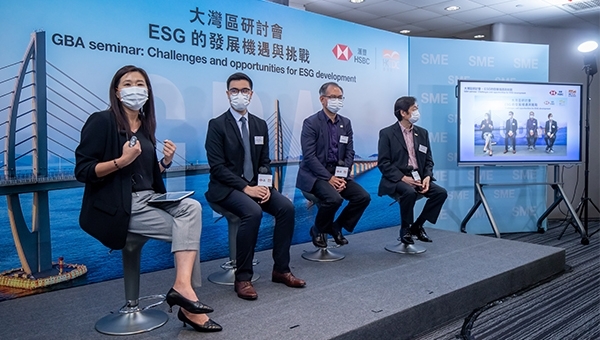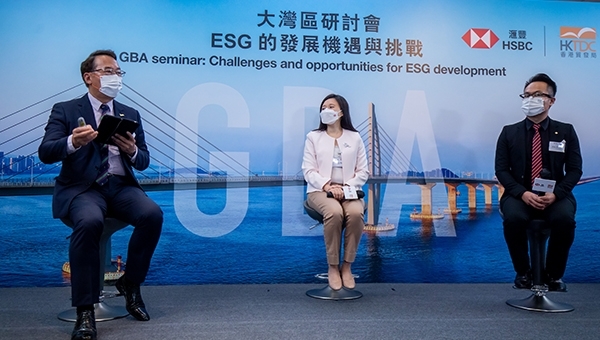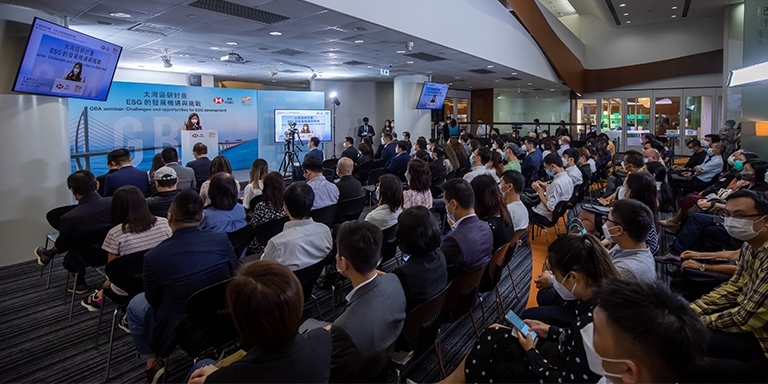With Mainland China setting 2060 as the deadline for carbon neutrality, sustainable development has become an important goal for the Guangdong-Hong Kong-Macao Greater Bay Area (GBA). The Hong Kong Trade Development Council (HKTDC) and global bank HSBC have teamed up to help small and medium-sized enterprises (SMEs) upgrade in order to achieve environmental, social and governance (ESG) objectives.
The HKTDC and HSBC recently ran a seminar on this issue, inviting industry elites to discuss ESG trends and experiences and help SMEs grasp the concept of sustainable development so they can upgrade and transform, and put themselves in a better position to seize green opportunities in the GBA.
Implementing ESG
Dr Patrick Lau, Deputy Executive Director of the HKTDC, said in his welcome remarks at the webinar that in order to combat climate change, governments around the world had recently set the goal of carbon neutrality. In the past two years, investment in sustainable development has increased 15% to US$35 trillion. It is estimated that by 2030 this amount will rise to US$90 trillion, so the required capital is huge. As an international financial centre, Hong Kong can provide diversified financing channels and promote the development of the green economy.
ESG concerns have become considerations for banks when reviewing loan applications and for buyers when selecting suppliers, Dr Lau pointed out. Enterprises can also use ESG to upgrade and transform, and introduce innovative technologies to solve inherent problems, which will help expand their business and help them to go further.
In a survey conducted by the HKTDC Research Department, more than half the respondents believe that if companies ignore ESG, they will miss business opportunities and lose customers, damaging their reputation and hindering long-term development.
The HKTDC actively promotes Hong Kong's role as an ESG financing and innovation centre through large-scale events such as the Asian Financial Forum (AFF) and Eco Expo Asia. It also helps SMEs master ESG knowledge and skills through its T-box upgrade and transformation programme. In December, the Council staged the "SmartHK" in Guangzhou to promote Hong Kong's professional services to enterprises in the GBA, and ESG was in focus.
Giving her welcome remarks at the webinar, Christina Ong, Head of Business Banking, Commercial Banking at HSBC Hong Kong, said sustainable development was an issue for all firms, not just large ones. Investors favour firms practicing ESG, and these companies attract a new generation of talent.
She said the results of an HSBC’s “HSBC Navigator” survey last year showed that setting sustainable development goals was one of the three main measures Hong Kong enterprises could take to improve resilience, and that ESG adoption could bring income growth to enterprises.
HSBC's “Asia Supply Chains: A New Era” survey released in March this year also pointed out that one-third of companies had integrated sustainability elements into their supply chain management. As the green ecosystem in the GBA matures, Hong Kong SMEs can seize more business opportunities in green trade, green supply chains and other fields.
The HSBC Group in 2020 set a target of providing between US$750 billion and US$1 trillion in sustainable financing and investments by 2030 to support clients in moving towards a more sustainable business model. HSBC also put US$5 billion into the Greater Bay Area Sustainability Fund in mid-May to provide green financing for enterprises of different scales, industries and early profitability to help them implement a low-carbon transformation more quickly.

Listed firms' ESG experience
In his keynote speech, "The Opportunities and Challenges ESG Brings to Enterprises", Simon Ng, CEO of the Business Environment Council, said the ESG performance of enterprises is disclosed in ESG reports. In addition to ISO certification, Task Force on Climate-Related Financial Disclosures (TCFD) is an internationally recognised ESG indicator. TCFD provides a framework for companies to provide relevant information to investors, lenders, insurers and other stakeholders.
Last year the Hong Kong Stock Exchange adopted the TCFD's proposal on listed companies disclosing information related to such issues as carbon emissions and codes of conduct on corporate governance. Investors in have been asking questions about green initiatives by companies. Mr Ng believes SMEs can draw on the ESG experience of large companies for reference, while many platforms in Hong Kong provide resources to help SMEs meet ESG opportunities and challenges.

ESG brand effect
In the interactive discussion session titled "ESG strategies for GBA companies to Respond to Regulators and Overseas Buyers' Requirements", Miranda Kwan, Director of Knowledge Solutions at SGS, said SMEs can adopt ESG based on risk assessment. At present, the key risk is attracting and retaining Hong Kong talent, and Ms Kwan explained that her company has always had difficulty recruiting environmental protection professionals. Recently, many universities had sought to create more ESG-related courses, reflecting the shortage of relevant talents. Therefore, talent is one of the key challenges faced by SMEs in implementing ESG.
She also pointed out that SMEs can pay attention to risk factors such as whether the product design is environmentally friendly, whether the materials used are sustainable and whether customers will buy them. At present, there are many places in the market that offer free ESG assessments or TCFD courses to help SMEs understand ESG. She believes SMEs can improve their prospects if management focuses on ESG.
Another speaker, Jason Ho, Senior Consultant (Sustainability Consulting) at ELEVATE Hong Kong Holdings Limited, said many large Hong Kong companies are paying more attention to ESG and associated risks, especially in the supply chain. In the past two years, ESG supply chain risks have increased. There is also more attention focused on areas such as employee welfare, human rights and climate change.

Green disclosure
Many investors in large companies require firms to disclose ESG risks, and Mr Ho pointed out that the Hong Kong Stock Exchange (HKSE), Hong Kong Monetary Authority (HKMA) and other institutions have gradually increased ESG requirements in recent years. This obliges large companies to implement such policies.
"I believe ESG requirements will soon be implemented and impact SMEs,” he said, suggesting that the first step for such companies is to establish a risk-management system that covers company-wide operations. ESG and operation-related departments should not operate independently; all departments and employees must conduct ESG risk management in coordination to increase corporate flexibility.
King Lai, Chief Financial Officer and Group Director of Leo Paper Group (Hong Kong), said companies needed to understand two issues with ESG –firstly that resources allocated to ESG constitute investments, not expenses, and the allocation will achieve ideal returns in the long run. The second issue is that firms need to take the initiative, regarding ESG as a challenge and an opportunity rather than something that are forced to do.
Mr Lai said that ESG has become obligatory because customers, the Central Government and the Hong Kong SAR Government all require companies to do it. He believes proper execution of ESG can have a positive brand impact and improve publicity and promotion.
He explained that Leo Paper started from scratch 40 years ago as a micro-enterprise. It had grown to more than 13,000 people with three factories, including plants in Hunan and Vietnam. Leo Paper is not listed but since 2003 it has produced annual reports in accordance with the requirements of the HKSE for listed companies to disclose company information and improve transparency. Since 2009, it has also published corporate social responsibility/ESG reports for 12 consecutive years.
So far, the company has obtained 32 internationally recognised management system certifications, including social responsibility, quality management, environmental protection and risk management. The group expects to achieve four targets by 2025, including an 80% reduction in organic emissions, a 60% reduction in hazardous waste, and a 25% reduction each in carbon dioxide and industrial water output.
Engineer CS Ho, General Manager of the BEAM Society Limited, said that if SMEs can seize the ESG opportunities, they can become large companies or even go public in future – and listing regulations require listed companies to have ESG policies. The Hong Kong Companies Ordinance also mentions that the annual report submitted by the company must include disclosure of all aspects of the environment – meaning that as long as it is a registered limited company, it must be done.
He also pointed out that bank lending is increasingly focusing on enterprise risk management. At the end of last year, the HKMA announced the results of its climate risk stress-test pilot scheme. The test found that climate risk could have a material adverse impact on the banking industry and that banks needed to manage climate risk, including incorporating broader climate risk factors into the risk assessment framework, as well as dedicating more resources to green financing and providing transition financing to clients to assist them in transitioning to low-emission business models.
A number of foreign surveys have also shown that green buildings bring a variety of benefits, including increased occupancy rates, rents and asset values of properties. On the corporate side, green buildings can reduce employee allergies and respiratory problems, reduce sick leave and improve productivity. They can also reduce employee turnover due to optimism about the company's sustainable development prospects.
Funding ESG upgrading
Another interactive discussion on how SMEs can use green finance and government funding to upgrade ESG was moderated by Paul Pong, Managing Director of Pegasus Funds and Founder of the Institute of Environmental, Social and Corporate Governance Benchmark. He said the GBA had many supply chains and it was very important to fully practice ESG across the supply chains. It was not feasible for one SME to practice ESG while other firms on its supply chain did not.
Many young people describe themselves as citizens of the earth and are passionate about ESG and very committed to putting such policies into practice. Technology start-ups established by young people often also have an ESG position and have great potential for long-term development.
If SMEs do not practice ESG, they will be unable to progress and negative consequences will catch up with them, weakening competitiveness in the long run. If, however, SMEs take the initiative in the present environment with limited competition and government subsidies available, implementation of a green transformation plan will open many fresh opportunities, create potential returns and could transform SMEs into large enterprises.
Another speaker, Carrie Ng, Head of Sustainable Finance, Commercial Banking, HSBC Hong Kong pointed out that sustainable finance can be divided into two types of loans. The first loan had a specific purpose, the most common being a green loan allocated to sustainable projects such as installing LED lights to reduce power consumption, improving plant machinery to achieve energy-saving efficiency, and replacing fleet vehicles with electric or hybrid versions. A building with green certification also becomes a green project, and customers in its supply chain can obtain green loans.

Evaluating projects
Companies needed to have a system to evaluate and select green projects as investments. After receiving a loan, the funds must be trackable and the borrower will need to disclose what green projects the funds were used for and the impact of green projects on the environment. In addition, relevant information on green projects can be disclosed if companies have obtained relevant certification or third-party assessments.
Ms Ng said the second loan type had no restrictions on fund use. The bank and customer mutually set ESG indicators, addressing for example greenhouse gas emissions or proportion of power derived from renewable sources for “E”, employee benefits and training hours, for “S” and company diversity data, such as board of directors composition, for “G”. Enterprises can set three to five indicators, and banks will adjust credit costs according to whether the enterprise meets the standards.
The last contributor to the discussion, Alex Zhong, Director of XELA Innovation Limited, pointed out that SMEs need additional funds to practice ESG. The Hong Kong and mainland governments have a variety of funding schemes suitable for ESG upgrades that can be applied for.
Mr Zhong believes SMEs can optimise the benefits of upgrading by making comprehensive use of various funding schemes. Giving an example, he said that in 2020 a customer who set up a toy factory in Heyuan, Guangdong, was asked by the environmental protection department to upgrade energy-saving and emission-reduction measures, otherwise the factory would have to be closed and stop production – measures that were expected to cost about HK$2 million (US$255,000).
He helped the client comprehensively plan the HK$2 million expenditure and other future operating expenses of the plant, creating four independent budget plans that could be used to seek clean production financing. The budget plans were submitted to the Hong Kong Government's Cleaner Production Partnership Programme (CP3), the Special Fund for Brand Development, Upgrading and Transformation and Expansion of the Domestic Market (BUD Fund), and the Technology Voucher Program (TVP), as well as the Central Government's clean production-related projects.
The four funding schemes attracted about HK$2 million in subsidies, completely offsetting the additional funds the company needed to invest in this ESG upgrade. Similar project planning will boost the willingness of SMEs to adopt ESG upgrading and transformation measures, helping to achieve the broader sustainable development goals of society.
Related links
HSBC
HKTDC T-box
Full video

